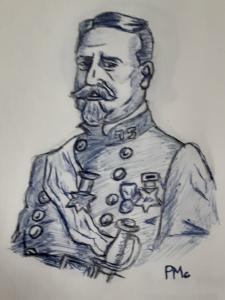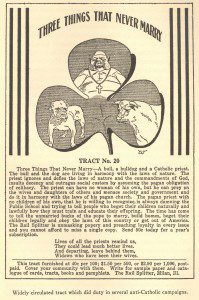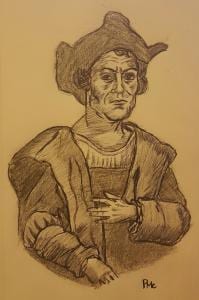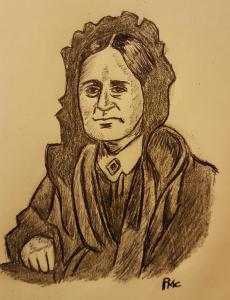![jancatholicworld68pauluoft_0429[1]](https://wp-media.patheos.com/blogs/sites/224/2013/11/jancatholicworld68pauluoft_04291-229x300.jpg) In 1899, the New York-based Catholic World, an operation of the Paulist Fathers founded in 1865, featured a series on Army and Navy officers who had recently served in the Spanish-American War. This March 1899 essay is a part of that series:
In 1899, the New York-based Catholic World, an operation of the Paulist Fathers founded in 1865, featured a series on Army and Navy officers who had recently served in the Spanish-American War. This March 1899 essay is a part of that series:
Catholic Officers in the Army and Navy: Lieutenant-Commander William B. Barry, U.S.N.
Lieutenant-Commander William B. Barry, was born October 20, 1849, in New York City. His father Garret V. Barry, late Pay-Director in the U.S. Navy, was the son of the rightful Earl of Barrymore, his mother the daughter of the late Thomas Glover. In 1862 he was sent to the Jesuit College of St. Francis Xavier in Fifteenth Street, New York City, where he remained three years completing the grammar course. He entered the Naval Academy in July, 1865, at Newport and completed the then four year course in June, 1869.
In September, 1883, he was ordered to the Naval Academy as instructor, and in 1886 was detached and ordered to the Alliance in the South Atlantic Squadron. In 1888 he made a cruise through the Straits of Magellan, and in November 1889, he was ordered to the Bureau of Navigation where he served under Francis M. Ramsay.
In 1891 he again joined the Asiatic Squadron and after a cruise of two years was attached to the Office of Naval Intelligence at Washington. In August 1897, the Cincinnati was repairing at New York, and Lieutenant-Commander Barry was ordered to her as Executive Officer. The revolution in Brazil necessarily demanded the presence of a U.S. ship and thither he was sent. When the excitement died away a cable dispatch indicated serious difficulties with regard to Cuban affairs, and the Cincinnati was ordered to the northern limit of the station. Upon receipt of the news of the “blowing up” of the Maine the Cincinnati received permission to return north and arrived at Key West, where was assembled the most powerful fleet ever under the U.S. flag. The Cincinnati sailed for Cuba and established the blockade off Havana, then she was sent to the eastward to blockade Matanzas and Cardenas. About this time, the whole nation was disturbed by the report that the Cincinnati was wrecked. The report was caused by the debris marked Cincinnati which had been found after she had cleared for action. On April 27 the Cincinnati was ordered to Key West—word having been received that Admiral Cervera’s fleet was at Curacoa. In spite of orders the Cincinnati left Key West to scout off the western end of Cuba and to prevent the Spaniards doubling up the weak blockade along the northern coast.
The Cincinnati again returned to Key West, and was ordered south. In the meantime Cervera’s Squadron had been destroyed and Santiago had fallen. The war was over. Later the Cincinnati aided in the landing at Ponce, and during an attack made by the Spaniards on the lighthouse occupied by U.S. soldiers the Cincinnati swept the neck of land with her fire, connecting it with the main island. The attack was unsuccessful. On August 14 the town informed the ships of the armistice and Lieutenant-Commander Barry, the first American to visit the town after war was declared, went to call on Captain-General Marcias to learn the situation. The Cincinnati remained in the vicinity of Cuba until after January 1 of this year, and participated in the flag raising at Havana.
In due time she reported at the Brooklyn Navy Yard, where she is now being overhauled. The regard with which the crew hold Lieutenant-Commander Barry cannot be better shown than by an occurrence that took place during one of his foreign cruises. He was given command of the boats for practice, to keep the men away from the town. The tropical sun was beating upon the poor men, and he, touched by their suffering, gave them permission to leave the boats. All but one returned, and of course when they returned to the ship the young lieutenant was placed under arrest until the man should be found. That night every man who had his liberty asked permission to go ashore, and arranging themselves into several scouting parties did not return until they had found the deserter and freed their beloved Lieutenant. “Barry,” said a Navy Officer, “is one of the best informed men in the Navy, a faithful officer, a devoted student, a practical sailor. Of his daily life the following tribute was paid by an observant comrade.” “He is a magnificent Catholic, a conscientious Christian.” His characteristic love of study was manifested in a statement he was heard to make a short time back: “I am glad the war is ended, I can now get back to my books, I have not read anything for months.” In the hands of such men we need fear to trust our nation’s honor or the people’s interest.
The Catholic World (March 1899): 857-859.











